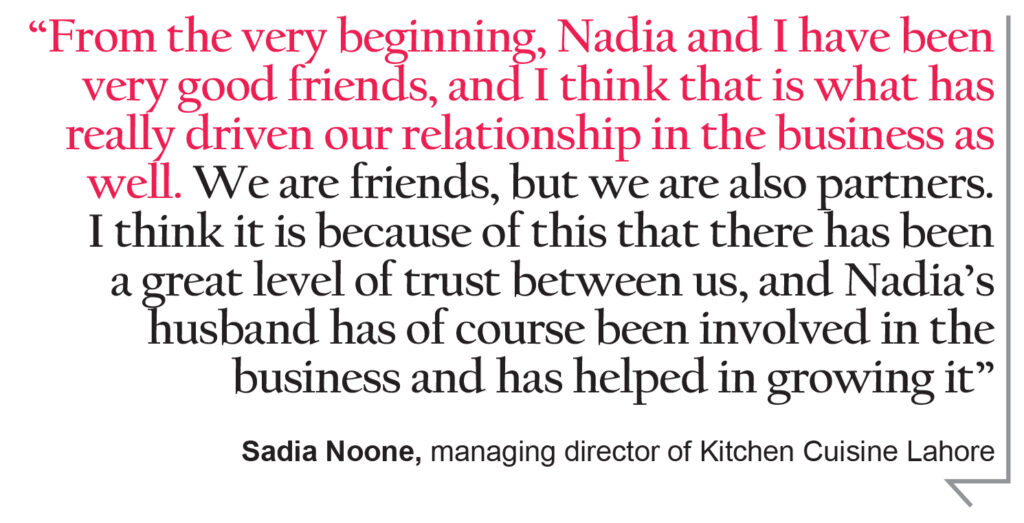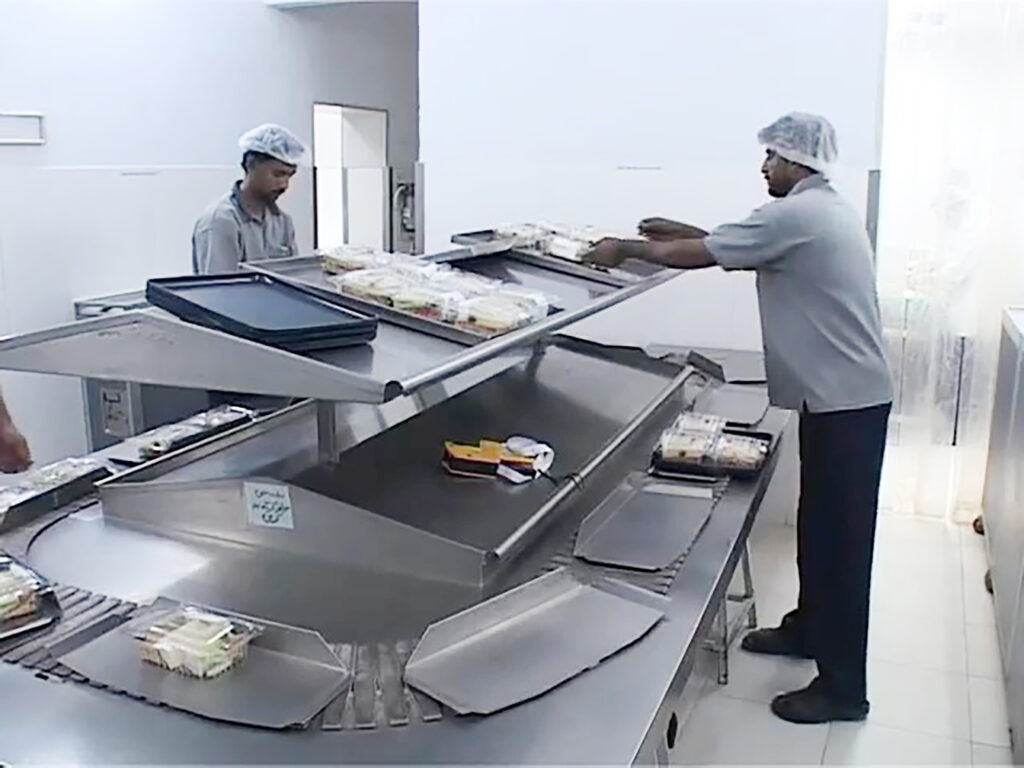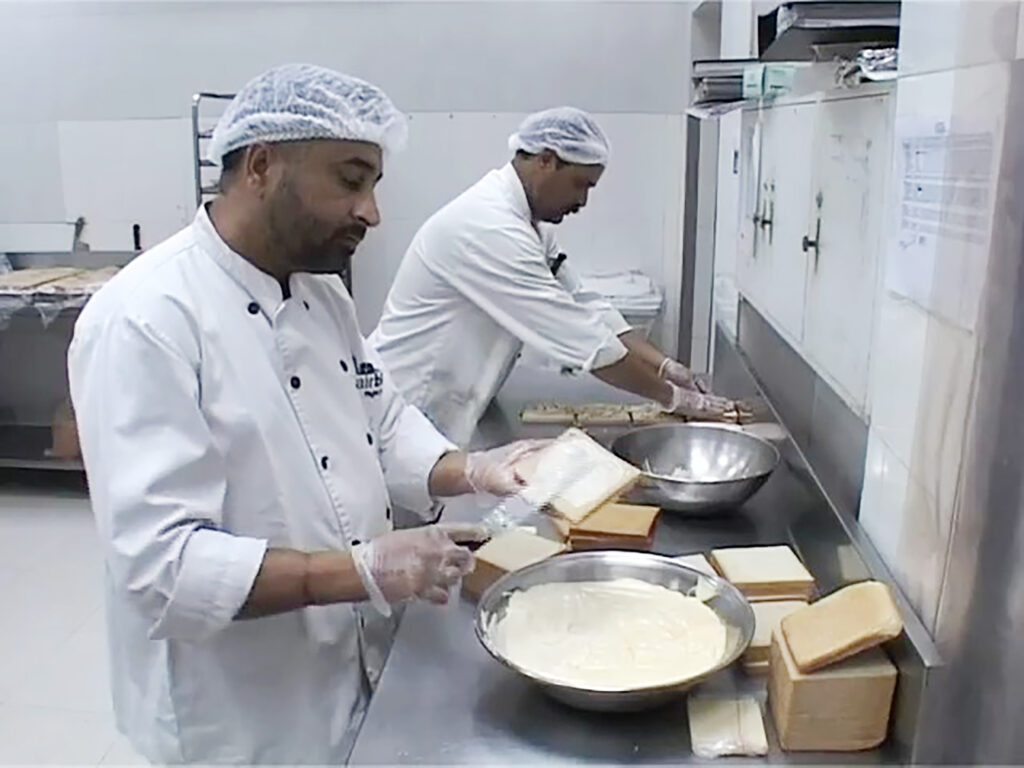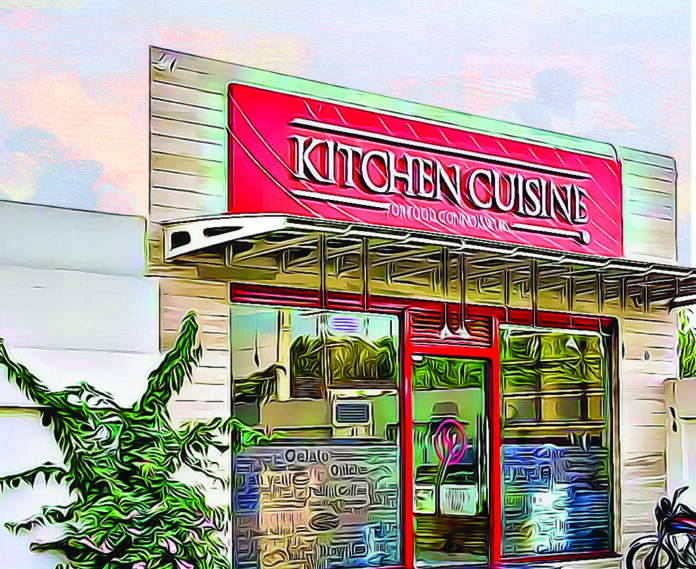There is, among the middle class of Lahore, a nostalgic fascination with the lemon tarts from Shezan bakery. On Twitter, in colleges, and in workplaces Lahoris regularly bond over the overly sweet lemon curd encased in the hard shell that they would end up buying on visits to the chain bakery that were meant to get only eggs and bread.
Now, the culinary world is not really Profit’s realm of expertise, but for a brief moment we will ask our readers to humour our attempt to make a comment on food. Shezan’s lemon tarts, while a nice little treat, cannot in all honesty be called a lemon tart. By definition a tart needs to taste, well, tart. The Shezan lemon tarts simply lack the acidity, and the sharp, acetic flavour profile that a lemon tar should have.
But for most Lahoris, Shehzan’s sweet, honeyed, and largely ornamental lemon tarts were the only ones widely and readily available. That was until Kitchen Cuisine arrived on the scene. In the mid-1990s, the now widespread Kitchen Cuisine opened its first commercial outlet in Lahore on MM Alam road, and it was an immediate hit.
Bakeries like Shezan had been around since the early 1960s, and while they had found popularity and managed to grow significantly, their focus was always on products like bread, biscuits, and traditional mithai. Kitchen Cuisine burst onto the scene with chocolate fudge cakes, strawberry puffs, and lemon tarts that are actually tart. It is hard to imagine now, but back in the 1990s, this was a big deal.
High-end desserts were limited to either home-cooks that sold on pre-order, or you had to find imported items and take your own baking skills out for a spin. So to say that Kitchen Cuisine changed the perception of what pre-made desserts should offer would not be a stretch, and behind the entire operation has been Nadia Raja, an Islamabad based home-cook turned confectionery entrepreneur.

Raja began her journey from her kitchen at home, simply by making desserts for friends and family when they would visit. Eventually, people began asking her to make desserts for their parties and get-togethers, and very soon people outside of her circle were also asking for these services. Since those early days, Kitchen Cuisine has opened 20 branches across Lahore, Islamabad, and Rawalpindi as well as restaurants, a catering service, and most recently, has gotten into the airline catering business.
It has been an inspiring journey in many ways, but has not always gone smoothly. At different points KC has seen dips in popularity, and has been given a run for their money by the likes of competitors like Masooms. Right now, with the airline catering business and the coronavirus, times have been lean, and concerns have been raised over expansion plans throwing a spanner in what has been for decades a successful business model. But despite all odds, the one thing Kitchen Cuisine has always done best is persevere and bounce back stronger. Will they one more time?
A home-cook with no Instagram
It started out like any other home business. Nadia Raja would make desserts for her friends and her family at her house in F-7. As time went on and her skills continued to grow, she started a small business in which her friends and family would come over to her house, catch up, place their order, and pick it up the next day. Eventually, her desserts became so popular that people she did not know began approaching her for orders. Without any social media marketing, the business grew completely on the basis of word-of-mouth, and by those standards spread rapidly.
At this point, she was still only working with the domestic help already employed in her home. In 1988, Nadia and her family made a big decision and built a small structure inside their house to display some of her most popular items. The little room was constructed around a date tree, and in the early 1990s, security in Islamabad was not such a concern, so the gate to their house would remain open and people would come in and buy whatever it was that they needed. This was a very simple, cash-based business model that worked quite well.
At this point, it was Raja’s husband, who wishes to remain unnamed for anonymity, that saw the business potential in Kitchen Cuisine. He decided to quit as the Managing Director of a successful IT company in Islamabad, and devoted his time to the confectionary business completely. It was also around then that they realised there was a lot of demand from Lahore for their products. An alumnus of Kinnaird College, Nadia Raja had a vast circle of friends and family in the city, and it seemed to be the perfect place to expand the business. With her husband on board, the family decided to begin services in Lahore, which is where KC would really put down its roots. In 1993, Nadia Raja would get a loan of $3000 from the First Women’s Bank of Pakistan, which in those days amounted to nearly Rs 40,000.

The problem was that the Rajas were settled in Islamabad, but needed someone to look after their business in Lahore and look after it in a very hands on manner. This is when Nadia’s cousin Sadia Noone joined Kitchen Cuisine. The business was very low investment to begin with, and the share capital was low enough that they still do not have to file anything about their earnings with the Securities and Exchange Commission of Pakistan, something that is only for very small businesses – so one can imagine the scale of the endeavour when the first Kitchen Cuisine branch opened in Lahore.
“We basically started from inside our homes in Lahore as well,” Sadia Noone tells Profit, who herself is an accomplished baker and responsible for a lot of Kitchen Cusine’s signature products. “In those initial days it was a very small investment and it was completely a labour of love. Since those initial days, it has grown by a lot.”
Sadia Noone essentially came on board as a 50% partner in just the Lahore business. It became apparent very soon after this that the Lahore business would be where Kitchen Cuisine would flourish, and Sadia Noone was instrumental in spreading it. Normally, this is the point in Profit features where we begin telling the story of how success and jealousy start tearing apart families that build businesses together. In a pleasantly refreshing change, however, it appears that even three decades into the business the two sides of the family involved still have a very stable working relationship.
“From the very beginning, Nadia and I have been very good friends, and I think that is what has really driven our relationship in the business as well. We are friends, but we are also partners,” explains Sadia Noone. “I think it is because of this that there has been a great level of trust between us, and Nadia’s husband has of course been involved in the business and has helped in growing it.”
Of course, the journey has not been free of its bumps. Almost a decade into having set-up and established themselves in Lahore, Kitchen Cuisine was finally getting some competition. In fact, the bakery fell out of fashion some time around 2001-2002, which is also when Jalal Sons began a line of gourmet desserts, and new bakeries like Masooms were entering the space and really picking up the pace. Kitchen Cuisine’s whole popularity had been based on the fact that nobody else was doing what they were doing as well, but suddenly they had competition.
During this time they tried a number of things to come out of the oblivion new competition was condemning them to. This included trying cafe-style dining (the last of their cafe’s in Lahore went out of business a couple of years ago in Gulberg Galleria) and other methods. They were not conservative in their business approach, and after a few years that were stagnant and even on a downwards trend, they did manage to revamp their products, introduce new items, and keep a stronger check on quality assurance – a role in which Sadia Noone thrived in Lahore while Nadia Raja kept the ship steady in Islamabad.
Over the years, the core ethos of the business has been to provide the kinds of desserts that older chain bakeries just cannot compete with. While their prices were higher, they were not so much higher that Kitchen Cuisine was exclusively an upper-class brand. The reason why Sadia Noone was brought into the fold in the first place and why she remained successful was because the core focus has always been on making sure that the food is individually prepared, and that the staff making it are trained directly by the upper management, which abhors the idea of food items coming off a conveyor belt.
They very quickly managed to stabilize, and are generally considered a go-to bakery for quality desserts wherever they are found. In fact, soon after getting their first taste of fortune, a 2005 news item in Fortune shows how they grew and managed to stay on that track after that initial $3000 loan. In 2005, it was reported by Fortune that Nadia Raja was “the CEO of a popular nine-outlet national chain boasting about $3 million in annual sales and employing 220.” In the past 15 years, at least in terms of the numbers of branches, these numbers have doubled.
Don’t try to fix what isn’t broken
Perhaps one of the most admirable things about the Kitchen Cuisine story has been that they found a business model that works for them and stuck to their guns. Take, for example, Dost Muhammad – the first employee that Kitchen Cuisine had from the days when it was just Nadia Raja in the kitchen.
Any time a new branch would open or the staff would have to be trained, Dost Muhammad would be assigned the job. It has been more than 30 years and he is still involved with the company. Over the years, KC has shown its ambition. In 2001, a restaurant by the name of ‘KC Grill’ was launched, and in 2006 they would also enter the airline catering industry. Today, Dost Muhammad isn’t training new cooks for a branch, but is involved in the airline catering side of the business. The problem? It isn’t going as well as the KC management had imagined.

The airline catering business is very different from the bakery business that Kitchen Cuisine had been running before. In essence it does have to do with the food, but it operates in an entirely different transactional mode. With a bakery, you have countless individual clients and you are not dependent on any one group of people even. In the airline catering business, there are only a few corporate clients. Add to this the fact that suddenly Kitchen Cuisine had a lot of money tied up in credit after decades of doing a cash based business, and you start to worry about cash-flow problems.
At this point, the threat is that the backlash from the airline catering business is hitting the bakery business that has been thriving for 30 years. According to sources that spoke to Profit anonymously, Kitchen Cuisine has been teetering on the brink of defaulting at different points. Payments for their fleet of cars to JS bank, while not late, have regularly been submitted at the last possible minute. Suppliers have also been complaining about not being paid on time. A major blow came when one of their corporate clients, Shaheen Air, went bankrupt leaving tens of millions of rupees in receivables tied up. And after the blow from Shaheen Air going bankrupt, another one of their major clients, PIA, has also been holding back payments. These are all classic signs of cash flow problems in any company.
Again, we must say at this point that Kitchen Cuisine has operated very successfully over the years. The one thing that has remained constant is the commitment to quality, and that holds true even now. It has been a very ‘keep your head down and do good work’ approach. Over the years, bakeries like Masooms gave Kitchen Cuisine a run for their money. They had flashier products, better marketing, and a younger, cooler vibe that sustained them. Meanwhile Kitchen Cuisine did not have a Facebook page until 2012. Despite this, they have been able to overcome their slumps and be the go-to bakery, at least in Lahore, where they currently have 16 branches.
But perhaps one false step might have been not separating the bakery business and the airline catering business. One can see why the decision was made, because with their regular catering business and restaurants, there has been no need to separate the businesses because they have been successful. And to be fair, while there has been a serious learning curve involved, the airline business has also been profitable.
Airline catering and cashflow
True to form, it was not Kitchen Cuisine that sought to join the airline catering industry. It was Airblue that pitched the idea for Kitchen Cuisine to cater their flights, and that is how they got their start in Karachi in 2006. By 2008, they had already established facilities in Lahore and Islamabad, and airlines had been receiving positive reviews from their customers.
In 2011 they provided scheduled inflight catering uplifts to their first international carrier, Uzbekistan Airways, from Lahore. After this, they would continue to bag other clients. Two years later in 2013, KC first established a facility in Sialkot which was followed by them getting both Shaheen Air International as a client, and catering their first Emirates flight from Islamabad. By the next year they had started provision of services for the national carrier, PIA, and catered their first foreign dignitary flight from Saudi Arabia. Very quickly after this, Malindo Air and Srilankan Airlines would use their services in 2016, and Serena Air would by 2017. In the meantime, they made major expansions on their Lahore facility and opened a new state of the art facility in Islamabad in 2017 to go with the new airport.
For all intents and purposes, they were working diligently and providing quality service. The problem was that they misread the situation. Airlines do not pay immediately on cash like their bakery customers, which means that since the bakery and the airline catering business were not separate, cash flow from the bakery side was being used to fuel the airline catering business. At this point, Shaheen International went bankrupt. It was at that point Pakistan’s second largest airline, and when it liquified in 2018, it still owed Kitchen Cuisine an amount that ran in the tens of millions, a loss in receivables that would cause problems for much larger companies.
With Shaheen Air gone, PIA on the brink of destruction, and flights majorly affected by the Covid-19 pandemic, there are clear concerns that the numerous facilities they had set up all over the country are being underutilized. These are all real worries, and perhaps some of the bigger challenges that Kitchen Cuisine has faced in its more than 30 year history. What is hopeful, however, is that their bakery business is still standing strong, and slumps have come and gone before.
What could the company possibly do to mitigate the problems it has been having? For starters, the obvious play would be to separate the bakery business from the airline catering business. The airline catering business needs attention, but it cannot continue to be supported by the bakery. The bakery business model has stood the test of time, and using it to run other sides of the business is a slippery slope that could lead to sacrificing a golden goose.
There is, also, the possibility of the company expanding into other cities and approaching a private equity player to bridge the cash flow gap and also fund the growth. Its success up until now has been based on the strong family basis on which it is built, but it has grown far beyond a typical mom-and-pop bakery. In the years to come, they might want to think about turning it into a franchise – offers for which they have received over the years but have not accepted because of quality concerns. There could also be the possibility of an Initial Public Offering at some point – all part of the many options Kitchen Cuisine should use to continue to do what it has done so well for so long.










I can remember KC opening bakeries in Karachi which later closed, but no mention of it in the otherwise very informative article or why they failed in Karachi.
Interesting that the article does not mention once the substandard, usually expired content KC sells specially in Islamabad which is the main reason of KC not working at its potential. Just do an exit survey at any of their outlets and add the info too. The story is not complete without it.
Their items are really tasty and they are one of the top bakeries in town, however the quality control is horrible. Ask any customer and he would tell you he is here because the items are great, but hardly anyone would bet on them being fresh or tasting same as before.
The KC outlets in Islamabad are very bad, with bad quality food at high prices. I used to be a fan of KC in the early 200’s but no more. KC is not relevant, atleast in Islamabad.